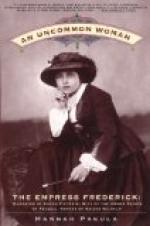Biron was emperor, although he bore only the name of regent; he had the power and the dominion; the infant nurseling Ivan, the minor emperor, was but a shadow, a phantom, having the appearance but not the reality of lordship; he was a thing unworthy of notice; he could make no one tremble with fear, and therefore it was unnecessary to crawl in the dust before him.
Homage was paid to the Regent Biron, Duke of Courland; the palace of Prince Ulrich of Brunswick, and his son, the Emperor Ivan, stood empty and desolate. No one regarded it, and yet perhaps it was worthy of regard.
Yet many repaired to this quiet, silent palace, to know whom Biron would perhaps have given princedoms and millions! But no one was there to betray them to the regent; they were very silent and very cautious in the palace of the Prince of Brunswick and his wife the Princess Anna Leopoldowna.
It was, as we have said, about four weeks after the commencement of the regency of the Duke of Courland, when a sedan-chair was set down before a small back door of the Duchess Anna Leopoldowna’s palace; it had been borne and accompanied by four serfs, over whose gold-embroidered liveries, as if to protect them from the weather, had been laid a tolerably thick coat of dust and sweat. Equally splendid, elegant, and unclean was the chair which the servants now opened for the purpose of aiding their age-enfeebled master to emerge from it. That person, who now made his appearance, was a shrunken, trembling, coughing old gentleman; his small, bent, distorted form was wrapped in a fur cloak which, somewhat tattered, permitted a soiled and faded under-dress to make itself perceptible, giving to the old man the appearance of indigence and slovenliness. Nothing, not even the face, or the thin and meagre hands he extended to his servants, was neat and cleanly; nothing about him shone but his eyes, those gray, piercing eyes with their fiery side-glances and their now kind and now sly and subtle expression. This ragged and untidy old man might have been taken for a beggar, had not his dirty fingers and his faded neck-tie, whose original color was hardly discoverable, flashed with brilliants of an unusual size, and had not the arms emblazoned upon the door of his chair, in spite of the dust and dirt, betrayed a noble rank. The arms were those of the Ostermann family, and this dirty old man in the ragged cloak was Count Ostermann, the famous Russian statesman, the son of a German preacher, who had managed by wisdom, cunning, and intrigue to continue in place under five successive Russian emperors or regents, most of whom had usually been thrust from power by some bloody means. Czar Peter, who first appointed him as a minister of state, and confided to him the department of foreign affairs, on his death-bed said to his successor, the first Catherine, that Ostermann was the only one who had never made a false step, and recommended him to his wife as a prop to the empire. Catherine




